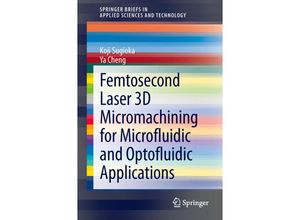Femtosecond lasers opened up new avenue in materials processing due to its unique features of
ultrashort pulse width and extremely high peak intensity. One of the most important features of
femtosecond laser processing is that strong absorption can be induced even by materials which
are transparent to the femtosecond laser beam due to nonlinear multiphoton absorption. The
multiphoton absorption allows us to perform not only surface but also three-dimensionally
internal microfabrication of transparent materials such as glass. This capability makes it
possible to directly fabricate three-dimensional microfluidics micromechanics
microelectronics and microoptics embedded in the glass. Further these microcomponents can be
easily integrated in a single glass microchip by the simple procedure using the femtosecond
laser. Thus the femtosecond laser processing provides some advantages over conventional
methods such as traditional semiconductor processing or soft lithography for fabrication of
microfluidic optofludic and lab-on-a-chip devices and thereby many researches on this topic
are currently being carried out. This book presents a comprehensive review on the state of the
art and future prospects of femtosecond laser processing for fabrication of microfluidics and
optofludics including principle of femtosecond laser processing detailed fabrication
procedures of each microcomponent and practical applications to biochemical analysis.

